
# 227
July 09, 2004
In this issue:
UNITED NATIONS DEVELOPMENT PROGRAMME (UNDP)
- Strengthening of UNDP Partnership with Regions: An Agreement of Cooperation Signed With Chui Province Administration
- UNDP Local Self Governance programme: The Kyrgyz Law on “Municipal Servants” is adopted
- UNDP Preventive Development Programme: Round Table “Youth Peace Initiatives”
- GEF/UNDP: Meeting of the National Steering Committee of GEF/SGP
UNITED NATIONS POPULATION FUND (UNFPA)
- World Population Day – 11 July
UNITED NATIONS DEVELOPMENT PROGRAMME (UNDP)
Strengthening of UNDP Partnership: An Agreement of Cooperation Signed With Chui Province Administration
UNDP and the Chui Province Administration signed an Agreement on Cooperation at the Governor's Office on 8 July in the province's capital Tokmok.
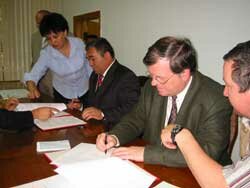 "Your successes are our successes as well", UNDP Resident Representative Jerzy Skuratowicz said at the signing ceremony. He added, "The province of Chui has a good potential to become a leader of economic reform in Kyrgyzstan, and UNDP will contribute for this process to develop successfully." "Your successes are our successes as well", UNDP Resident Representative Jerzy Skuratowicz said at the signing ceremony. He added, "The province of Chui has a good potential to become a leader of economic reform in Kyrgyzstan, and UNDP will contribute for this process to develop successfully."
Chui province is the most industrially advanced in the Kyrgyz Republic accounting for more than a third of the national industrial production. In 2003, the poverty level of the province went down from 23 to 18 percent.
UNDP has been implementing its programmes in Chui since 1998, and the signed agreement has cemented the high level of partnership between UNDP and the province government achieved so far.
The province can boast more than 700 successful community organisations and almost 100 self-help groups playing an increasing role in the territorial development. They are being assisted by two local development funds worth of nearly one million soms (app. 24,000 USD), which are transparently funnelled to small and medium-size businesses and help community organisations become sustainable and people confident in their future.
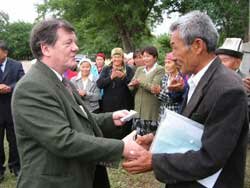 Besides, the community organisations' and self-help groups' own funds have already reached more than seven million soms (app. 160,000 USD). These means are used to improve rural social infrastructure and internal microcrediting for the poorest to stand firmly on their feet and gradually start their own businesses. Besides, the community organisations' and self-help groups' own funds have already reached more than seven million soms (app. 160,000 USD). These means are used to improve rural social infrastructure and internal microcrediting for the poorest to stand firmly on their feet and gradually start their own businesses.
"We want to expand province-wide the experience of those pilot rural municipalities where UNDP and local administrations are working together on poverty alleviation and improving capacity of local self-government", said Chui Governor Azamat Kangeldiyev. "We are positive that the province will gain a momentum with the signing of the agreement."
The Governor and the Resident Representative visited a number of villages where UNDP programmes are being implemented.
In the village of Bashkarasu the programme has been on since 2001. The community organisations supported by UNDP and local government have nearly completed the construction of a gym with a budget of more than one million soms.
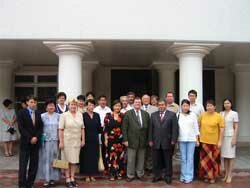 "When UNDP came to village we, sort of, woke up", Stamkul Kurmanaliyev, the leader of the community organisation ‘Bilim’ (means ‘Education’ from Kyrgyz) told the Governor and the Resident Representative. He added, "We understood that once we are united we can be up to many things, and this wonderful gym, due to be completed by October 2004, is a direct prove of that." "When UNDP came to village we, sort of, woke up", Stamkul Kurmanaliyev, the leader of the community organisation ‘Bilim’ (means ‘Education’ from Kyrgyz) told the Governor and the Resident Representative. He added, "We understood that once we are united we can be up to many things, and this wonderful gym, due to be completed by October 2004, is a direct prove of that."
When people realised that they took up a major problem of the village, clean potable water. There was never a water-supply system, and the villagers, more often children and elderly, had to go to a spring a kilometre and a half away. Now the community organisations with the support by UNDP have drilled a well from which clean water would be supplied through the entire village.
“When [UN] volunteers came, our people changed their way of thinking", said Head of Baitik municipality Saltanat Jumasheva, who had been a leader of the Community Organisations Associations before being popularly elected head of local self-government. She continued, "In six villages of our municipality 51 community organizations are active managing 700,000 soms (app. 17,000 USD). Thanks to that, ten projects have been completed, and six are in the final phase. Wherever you have strong community organisations, you have strong local government, and we will continue close cooperation with them."
"High economic activity of population is the basis for social mobilisation", said in his address to the officials of Chui province President Akayev on 21 January 2004. "Unlike in the past we don't have to campaign and appeal. It's the other way around now, when people appeal to the government to create conditions where they could work efficiently, earn more money and live a better life. The function of all branches of power and their duty is to give this opportunity", he said.
For more information, please contact Mr. Alexander Kashkarev, UNDP Programme Officer. Tel.: 0 (996 312) 61-12-13. Fax: 0 (996 312) 61-12-17. Email: or Ms. Olga Grebennikova, UNDP Public Affairs Officer at the same phones. Email:
Strengthening the Local Self Governance System: The Kyrgyz Law on “Municipal Servants” is adopted.
On the 30th of June 2004 the Legislative Assembly of the Kyrgyz Parliament approved the Law of Kyrgyz Republic on “Municipal Servants”.
The Law was prepared in the frame of the National Strategy on “Decentralization of State Governance and Local Self Governance Development in the Kyrgyz Republic through the year 2010.” The UNDP experts as the members of the working group took an active part in design and development of this draft Law.
A big organizational as well as methodological work preceded the Law adoption. Public Hearings on the draft took place on 21st of April 2004 in Legislative Assembly of the Kyrgyz parliament with participation of deputies of two chambers of the Kyrgyz Parliament, representatives of local self- governance bodies, non-government and public organizations and mass media. Recommendations on the draft law given during the discussions were considered in finalizing the document.
Besides, in the framework of the UNDP Local Self Governance programme, the circuit session of Committee on Government Structure of Legislative Assembly of the Kyrgyz Parliament took place in Issykkul in the end of May, 2004. The Chairman of Legislative Assembly, Mr. Erkebaev, the First Deputy head of President Administration, Mr. Januzakov, deputies of the Kyrgyz Parliament, province and district level councils, heads of local administrations, experts of international organizations, NGOs and mass media representatives participated in this discussion.
The members of circuit session discussed over all assets of draft law on “Municipal Servants” and made number of changes and add-ins, that had as editing characteristics, so comments on the content of assets related to the rights of municipal servants and administration of their guarantees.
In particular, it was recommended to foreseen to rotation of municipal servants in public service bodies and the same time regulate the rank awarding of municipal servants, the long-service bonus and other arrangements have social characteristics.
All these made a good contribution to successful passing of Law on “Municipal Servants” through the Legislative Assembly of the Kyrgyz Parliament and submitted for signature of President of KR.
For more information, please contact Mr. Alexander Kashkarev, UNDP Programme Officer. Tel.: 0 (996 312) 61-12-13. Fax: 0 (996 312) 61-12-17. Email:
UNDP Preventive Development Programme: Round Table “Youth Peace Initiatives”
On the 19 of June, 2004 with support of UNDP and Swiss Development Agency there was conducted round table “Youth Peace Initiatives” in Alabuka Branch of Kyrgyz-Uzbek University.
 The students and teachers of the Kyrgyz-Uzbek University have participated in this discussion as well as representatives of NGOs of Kasansay District of Uzbekistan and Alabuka District of Kyrgyzstan. The students and teachers of the Kyrgyz-Uzbek University have participated in this discussion as well as representatives of NGOs of Kasansay District of Uzbekistan and Alabuka District of Kyrgyzstan.
The main purpose of the Round Table was to promote a wide dialogue between youth of Kyrgyzstan and Uzbekistan and elaborate a joint strategy of conflicts prevention in cross border areas, as well as interethnic conflicts and conflicts occurred because of lack access to education.
“Now we have more than thousand students in our branch. Among them about 400 from four districts and Namangan city of Uzbekistan” said director of branch Salima Rysbaeva.
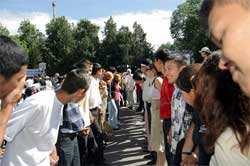 All necessary conditions for education was been originated in the University, but along with it there are other problems – shortage of books in Uzbek language and the problems of leisure, crossing the border and terminals by the students. With this reason many of students gave up and relinquish the University. Also there are no sport buildings in the University and hospices for students from neighbor countries, she added. All necessary conditions for education was been originated in the University, but along with it there are other problems – shortage of books in Uzbek language and the problems of leisure, crossing the border and terminals by the students. With this reason many of students gave up and relinquish the University. Also there are no sport buildings in the University and hospices for students from neighbor countries, she added.
Members of this round table have pointed out that without regard to increasing of potential of youth in the peacemaking process and developing of neighborly relations, they are not enough entrained in the process of cross border and other conflict situations prevention and resolving.
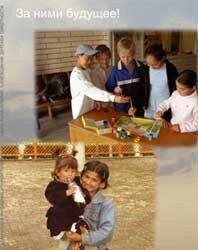 “The more initiatives will be offered by youth and the better you know your rights and responsibilities - the more guarantees that you’ll defend your rights” said in her address at the Round Table Ms. Dilbara Akramova, Hero of Labour of Uzbekistan and the consultant of UNDP and Swiss Development Agency project “Support joint efforts of local communities in resolving cross border problems in Kasansai (Uzbekistan) and Alabuka (Kyrgyzstan)”. “The more initiatives will be offered by youth and the better you know your rights and responsibilities - the more guarantees that you’ll defend your rights” said in her address at the Round Table Ms. Dilbara Akramova, Hero of Labour of Uzbekistan and the consultant of UNDP and Swiss Development Agency project “Support joint efforts of local communities in resolving cross border problems in Kasansai (Uzbekistan) and Alabuka (Kyrgyzstan)”.
“All your initiatives aimed at support of peace and harmony in the boundary areas would be supported by both Local Authorities and International Organization in our countries”, she said.
The participants of the Round Table elevated four candidates to participate in Civil Forum “Tolerance and partnership for peace and harmony” in Namangan (Uzbekistan).
Moreover, it was decided to establish a group of the most active students, which will be actively involved in UNDP and SDA various actions aimed at conflict preventions in the cross-border areas.
Note: The story is supplied by photo of the MDGs Student Festival in Bishkek took place in Bishkek in May 2004 and posters designed by Kyrgyz students in the framework of the Festival
For more information, please contact Ms. Mia Rimby, UNDP Programme Office. Tel: 0 (996 312) 61-12-13. Fax: 0 (996 312) 61-12-17. Email: , or Mr. Abdiraim Jorokulov, Manager of the UNDP Preventive Development Programme. Tel: (996 3222) 5-78-37, Fax:: (996 3222) 5-57-13, e-mail: [email protected]
GEF/UNDP: Meeting of the National Steering Committee of GEF/SGP
A meeting of the GEF/SGP National Steering Committee took place on 22 June 2004 in Bishkek.
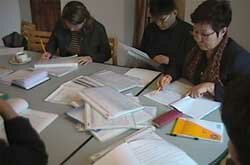 In addition to discussion of GEF Small Grants Programme current activities a new project proposals for GEF grants in the priority area of worldwide importance biodiversity preservation were rated at the meeting. In addition to discussion of GEF Small Grants Programme current activities a new project proposals for GEF grants in the priority area of worldwide importance biodiversity preservation were rated at the meeting.
Ten project proposals out of nineteen received by the National Steering Committee from Osh, Jalalabat and Batken Provinces of Kyrgyzstan, were approved for amount of 70 thousand US dollars.
All these projects are aimed at protection and reproduction of endangered species: birds and plants.
Note: The Small Grants Programme of Global Environment Facility is the global programme started in 1992. Currently, there are 63 countries are participating in SGP. In 2002, Kyrgyzstan was included in the programme. The objective of SGP is to ensure global environmental benefits by supporting community-based initiatives that improve both the environment and their lives and livelihoods in the priority areas such as Biodiversity (conservation and sustainable use), Climate changes (mitigation), International waters (protection), desertification and land degradation (related to above mentioned items)
UNDP launched the GEF/SGP in Kyrgyzstan in 2001. The GEF/SGP operates in a highly decentralized and country-driven manner through a National Coordinator and a National Steering Committee, with support of the UNDP Country Office.
The National Steering Committee (NSC) in Kyrgyzstan consists of 11 members including representatives of CBOs, NGOs, the environmental research and education sector, the UNDP country office, foreign and international programmes closely related to GEF focal areas, the mass media, the Ministry on Environment and Emergency, and bodies of local self-governance. The NSC provides overall policy guidance and ensures the programme is implemented according to the GEF/SGP requirements. It is responsible for reviewing and approving project proposals on the basis of their compliance with GEF criteria, sustainability, full community participation, and streamlining and transparency, among other considerations.
For more information, please contact Mr. Murat Koshoev, GEF/SGP and LIFE National Coordinator. Tel: 66-35-44, 66-33-82. Mobile 344-018. Email:
You could also get a lot of additional information if visit our web site http://gef.undp.kg/
UNITED NATIONS POPULATION FUND (UNFPA)
World Population Day – 11 July
As is well known, World Population Day (WPD) is celebrated on 11 July.
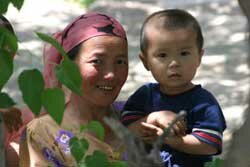 World Population Day – 2004 is focused on Programme of Action (PoA) adopted at the International Conference on Population and Development (ICPD) in Cairo in September 1994 and its implementation in the developing countries. World Population Day – 2004 is focused on Programme of Action (PoA) adopted at the International Conference on Population and Development (ICPD) in Cairo in September 1994 and its implementation in the developing countries.
The ICPD Programme of Action in Kyrgyzstan envisions a comprehensive solution of the demographic problems that takes into consideration economic, social, and ecological conditions, and respects various ethnic, religious, and cultural values and traditions.
This approach corresponds with the democratic reforms in Kyrgyzstan and necessitates advocacy of the ICPD objectives, tasks, and principles. Politicians, members of Parliament, representatives of the executive branch, private sector, NGOs, and the general public participated in this process at the national level.
Researchers and scientists suggest that Kyrgyzstan needs to reconsider established notions to solve the population and development issues.
This is especially important as the country undergoes a new stage of its state, political, and socio-economic development. Thorough scientific research of the interconnection between the demographic tendencies and socio-economic problems that consider the population as one of the main factors for the social development. The population factor should determine the overall development of the economic, social, and cultural life of the country.
In light of the 10th anniversary of ICPD PoA adoption, UNFPA office in Kyrgyzstan initiated some activities devoted to WPD, including TV Conference, poster contest and press conference for journalists.
TV Conference was conducted on 6 July 2004 at the studio of Kyrgyz National TV. The following issues were raised and discussed during the conference:
- Eradication of discrimination and violence against women and girls;
- Reduction of maternal mortality in the Kyrgyz Republic;
- Promotion gender equality and empowering women of Kyrgyzstan.
Participants of the TV Conference – Ms. Zoya Sultanovna, Honored Health Service Provider of the Kyrgyz Republic, representative of the Parliament of the KR, Ms. Dinara Sagynbaeva and Ms. Eugeniya Doskeeva, Ministry of Health representatives, Ms. Mayram Tilebalieva, Director, Association of Crisis Centers and Ms. Taalaygul Isakunova, Expert of the National Council on Family, Women and Gender Development issues – gave competent evaluation of the present situation in the KR and proposed taking some measures on achievements of progress in ICPD PoA implementation in Kyrgyzstan.
124 children at the age of 5 – 17 took part in the poster contest devoted to WPD. The subject of the contest was ICPD PoA. Arina Mihaylova (1 prize), Vladimir Malov (2 prize), Mark Zlatkin (3 prize) are the winners of the age group 5 – 7. Tilek Mukashev (1 prize), Aibek Soltobaev (2 prize), Eugeny Tsoy (3 prize) are the winners of the age group 8 – 12. Katya Milyutina (1 prize), Regina Baranova (2 prize), Lidiya Glebova (3 prize) are the winners of the age group 13 - 17. Also incentive prizes were distributed to children.
During press conference for journalists conducted in the UN House on 8 July 2004, Ministry of Health, National Statistics Committee and NGO representatives made an overview and progress in achieving of the implementation of the ICPD Programme of Action during the ten-year period.
Note: The objective of the ICPD Programme of Action is to raise the quality of life and the well-being of human beings and to promote human development by recognizing the interrelationships between population and development policies and programmes aiming to achieve poverty eradication, sustained economic growth in the context of sustainable development, education, especially for girls, gender equity and equality, infant, child and maternal mortality reduction, the provision of universal access to reproductive health services, including family planning and sexual health, sustainable patterns of consumption and production, food security, human resources development and the guarantee of all human rights, including the right to development as a universal and inalienable right and integral part of fundaments human rights.
For additional information, please contact Ms. Natalia Kim, UNFPA Secretary. Phone: (0 996 312) 61-12-02. Fax: (0 996 312) 61-12-04. Email:
|

